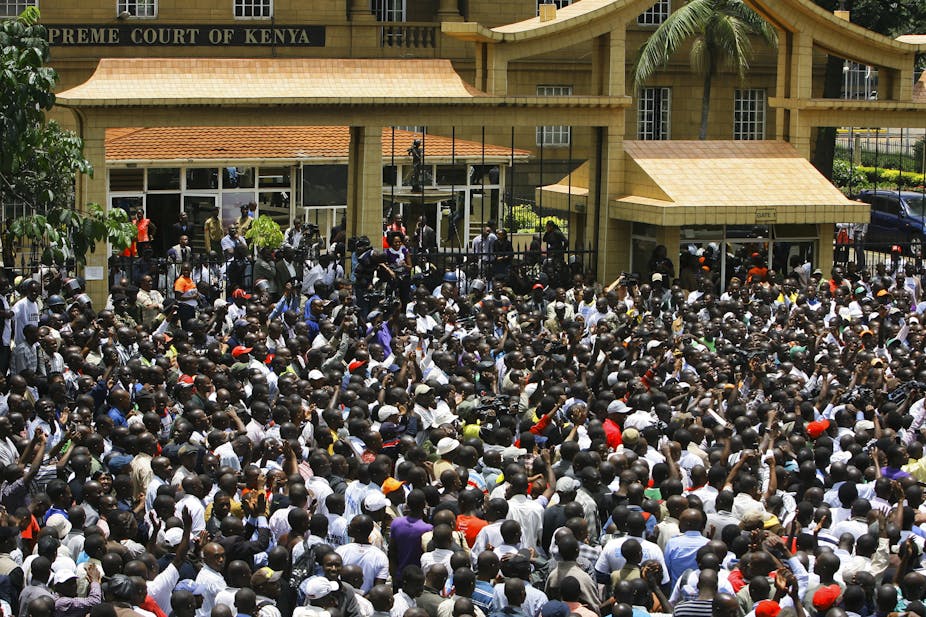After Kenya’s contested election result, opposition leader Raila Odinga announced he wouldn’t be seeking legal redress for what he termed “a sham of an election”. Three days later he’d changed his mind and said he would be contesting the election in the country’s Supreme Court.
This means that Uhuru Kenyatta’s victory is on hold pending a decision by Kenya’s highest court. Its decision is expected in early September. The Supreme Court bench will be constituted by seven justices. These are the Chief Justice David Maraga, his Deputy Lady Justice Philomena Mwilu, Lady Justice Njoki Ndung'u, and justices Smokin Wanjala, Mohamed Khadhar Ibrahim, Jackton Boma Ojwang and Isaac Lenaola.
The petition is effectively an audit of the electoral process. This is a good thing. To build resilience against election-related disputes, Kenyans must stay open to legal arbitration as a way of vetting the democratic process, and standing up for stronger democratic values.
Odinga’s case
The main grounds of Odinga’s petition are that some of the presidential results were derived from nonexistent polling stations by ungazetted presiding and returning officers.
Odinga is also claiming that the results that declared Kenyatta the winner were not submitted procedurally. This claim has been a source of controversy and is likely to form a large part of the petition.
Odinga is also likely to argue that the election commission chairperson acted contrary to the law because he didn’t have all the requisite tallying documents when he declared the result.
He will have to prove that:
Some of the requisite tallying documents were not presented and verified at the national tallying centre before the results were declared. He would then have to prove that the failure to present and verify the documents significantly altered the outcome.
The tallying documents did not present a truthful account of the vote – in other words that some were fabricated or falsified. If he can prove this then the integrity of the election will be called into question.
Possible outcomes
If the court finds that the presidential election was invalid a fresh election will have to be called. This would involve the presidential candidates who participated on August 8. If any abandon the electoral contest or die before the scheduled date a fresh nomination exercise would have to be held.
After Odinga’s 2013 presidential petition, the Supreme Court ordered a partial recount of votes before upholding Kenyatta’s win.
But this time around the court is likely to ask for closer scrutiny of the entire poll process.
Odinga has filed a 25,000-page petition, compared to the 800-page document he filed in 2013. This places a huge responsibility on the court to sift through all the allegations.
A number of potential factors could affect its decision.
Firstly , the Supreme Court is likely to be swayed by the opinions of 400 election observers who deemed the election credible.
Secondly, the current chief justice is known to be a moderate. His conservatism may mean that he will uphold the electoral commission’s position and maintain that the election was carried out in a free, fair and transparent manner.
Invalidating the general election would be unprecedented in Kenya. But it could happen because the chief justice is keen to demonstrate judicial independence. The judiciary has recently come under attack from political leaders for deciding in favour of the opposition in its determination of a series of high profile pre-election cases.
Letter versus spirit of the law
Ultimately, the judges could go one of two ways.
They could make a decision based purely on the letter of the law. Or they could opt for a judgement that adheres to the spirit of the law – in other words the intention of the law as opposed to its literal meaning.
A judgement based on the spirit of the law is likely to serve the greater good – that is a return to normalcy as quickly as possible.
In the 2013 presidential election, the Supreme Court set a standard of proof which it phrased in a question.
Did the petitioner clearly and decisively show the conduct of the election to have been so devoid of merits, and so distorted, as not to reflect the expression of the people’s electoral intent?
There’s no doubt it will ask the same question this time round.

